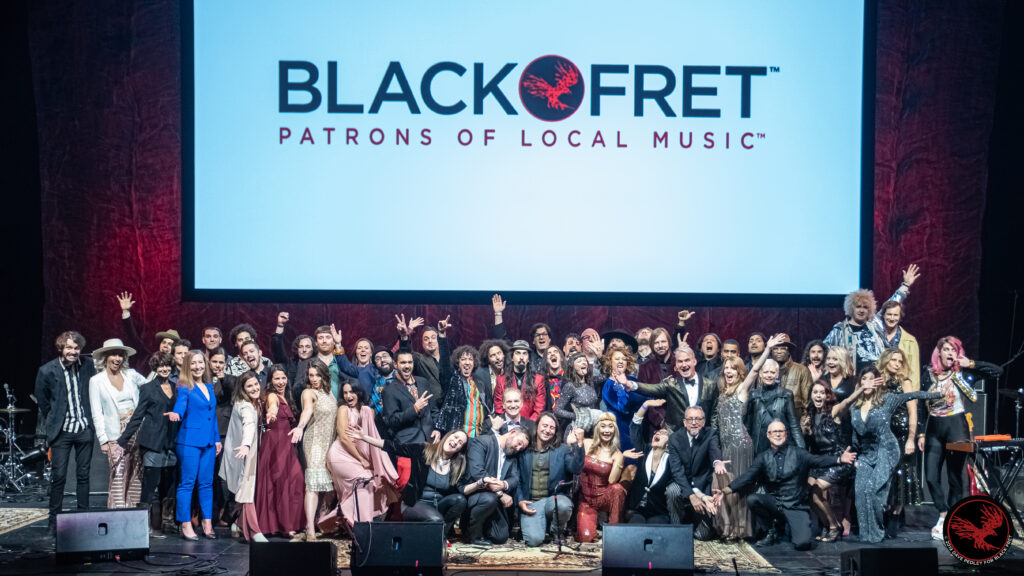Black Fret: A Music Nonprofit Gives Seattle Musicians Financial (and Industry) Support
Ben London has been a presence in the Seattle music scene for a couple of decades, both as a musician and in music industry positions with MoPOP, The Grammys, and Hewlett Packard among others. So he knows about the sometimes rocky road traveled by Seattle creatives.
To that end, he’s helping bring Black Fret, a successful musician-focused nonprofit, to Seattle. The mission: To get funds, industry expertise, and guidance into the hands of emerging Seattle musicians. “You have a perfect storm of the rising cost of living here, and the demonetization of recorded music,” he says. “We all want to keep this a music city. And while it’s great that musicians have free loading zones in town now for gigs, that [alone] won’t keep them in town. What they need is money.”
A Seattleite who recently marked his 30th anniversary as a resident of the city, London served as lead guitarist and singer in beloved local rock band Alcohol Funnycar for several years, experiencing the uncertainty of a musician’s life firsthand. “I remember, even when it was cheap to live here, how hard it still was to afford. And now, it’s so much tougher,” he says.
The major-label feeding frenzy that put Alcohol Funnycar within striking distance of major label success in the ’90s dried up by the end of the decade. After that, London embarked on the career path that’s culminated in his work as Executive Director of Black Fret Seattle.
The most significant of his music-adjacent positions (to the Pacific Northwest, at least) was his work at MoPOP, then known as EMP/Experience Music Project. He became one of the key architects behind SoundOff!, the youth-targeted band competition that’s become a valued incubator of local music talent in its 19 years of existence. “When we started SoundOff!, a few of my musician friends thought it was this corny battle of the bands thing,” London states, “but now it’s become this institution, and young bands set their clocks to it.” London sees similar potential longevity in Black Fret.

The roots of the organization began in Austin, Texas in 2013 as the brainchild of Austin music fans (and co-founders of what would become the Austin Music Foundation) Matt Ott and Colin Kendrick. London’s connection to it began last year when he was in Austin visiting friends, and he met members who’d attended the organization’s Black Fret Ball. “They mentioned this organization that gave grant money to musicians to make records and go on tour,” he says, “and I thought about how we could do something like that here.”
Initially, London had considered starting from scratch and creating a separate, unrelated grant program locally. But a conversation with Ott and Kendrick opened up the notion of an actual Seattle branch of Black Fret. “I met with Matt and Colin, and they told me that they were already looking to bring [Black Fret] here.” London states. “We realized that it just made sense to combine forces.”
The response from fellow musicians was immediate. “Right after we announced Black Fret, we just got this outpouring of musicians saying, ‘Thank you’,” London says.
Black Fret Seattle’s yearly cycle will run January to December, with nominees being chosen jointly by members and an advisory committee of music-industry pros. The field’s gradually narrowed down, partly based on live, Black Fret-sponsored performances. At the end of the year, members vote on grant recipients.
London’s still fine-tuning Black Fret Seattle, with an eye on what the organization’s flagship Austin chapter has done for that city’s music ecosystem: about 1.5 million dollars have been awarded to musicians over the last five years, and the organization’s efforts have also helped generate over two million in income for sound engineers and crew working the Austin area shows.
Today, Black Fret Austin boasts 500 members, and it puts on forty-plus shows a year in the Austin area. Last year, the Austin flagship organization gave out $250,000 in grant money in the form of ten $20,000 grants and ten $5,000 grants.
London says Black Fret Seattle will be starting smaller, with a dozen Black Fret events per year initially, and a membership goal of 100 members (as of now they’re only about twenty members away). The quantity and amount of the Seattle grants are still TBD, but will be in place by the time Black Fret Seattle launches fully in January.
Membership dues for Black Fret Seattle are six installments of $250 each for the year, which entitles a member to two admissions to each performance. 80% of the membership fee is tax deductible and the dues are eligible for corporate match. London admits that the membership dues aren’t for every budget, “but for that money, you’re getting a pair of tickets to see the area’s best and brightest, playing in specially-curated, members-only events in unique venues,” he says. “It’s not just a stack of tickets to a dozen shows at the same venue.”
People in the position to join also tend to skew slightly older, which London sees as a valuable and enthusiastic source of support. “In a lot of ways, the music industry’s kind of forgotten about people over 30,” he says. “Oftentimes, these are people who love music, but for reasons of work or family, can’t always get out to shows.”

Black Fret shows are scheduled out six months in advance, usually Saturdays, and they run from 7 to 10 pm, representing the best of both worlds. “So you can see two great bands, then get home at a respectable hour if you’re concerned about a sitter or work the next day,” London says, “or if you still want to stay out, you have the rest of the evening ahead to do that.”
Black Fret’s goal is giving musicians the tools they need to move forward in the industry, as well as funds to help them along. “This isn’t just us writing a check,” London says. “Our Advisory Board will be comprised of a variety of music industry professionals, who’ll be able to help musicians with where to spend those dollars.” This includes everything from purchasing equipment to recording costs to touring to marketing. “That way, when an artist or a band gets to that next level with a major label or a publisher, they’ve got some leverage and experience.”
Black Fret’s generated a lot of positive buzz among the Seattle music community: No less a figure than Pearl Jam’s Mike McCready tweeted, “I love when new/emerging artists are supported! Look forward to seeing how #BlackFretSeattle makes their mark in Seattle! I fully support this.” But London acknowledges that there’s a journey ahead.
“The second we give dollar one away to some artists but not everyone, that’ll be a challenge. But I’d rather do something to help musicians than do nothing,” he says. “This isn’t the solution, but its a solution that will get money and assistance to artists quickly.”
And for all of the concern about Seattle’s status as a music city and cultural hub being threatened by the encroachment of the tech boom, London remains equal parts open-eyed and optimistic. “The Bay Area music scene is a real cautionary tale,” he says. “And rather than lose all of our artists to the rising cost of living and have to rebuild a scene from scratch, we should do whatever we can to save the music scene we already have.
“There’s this prevailing resignation that Seattle’s just been done to death,” London adds. “But we have to have agency for our own cultural future. No one’s going to give it to us. We have to create the things that support our music community.”
More information on Black Fret, and how to join Black Fret Seattle, can be found at the Black Fret website, here.